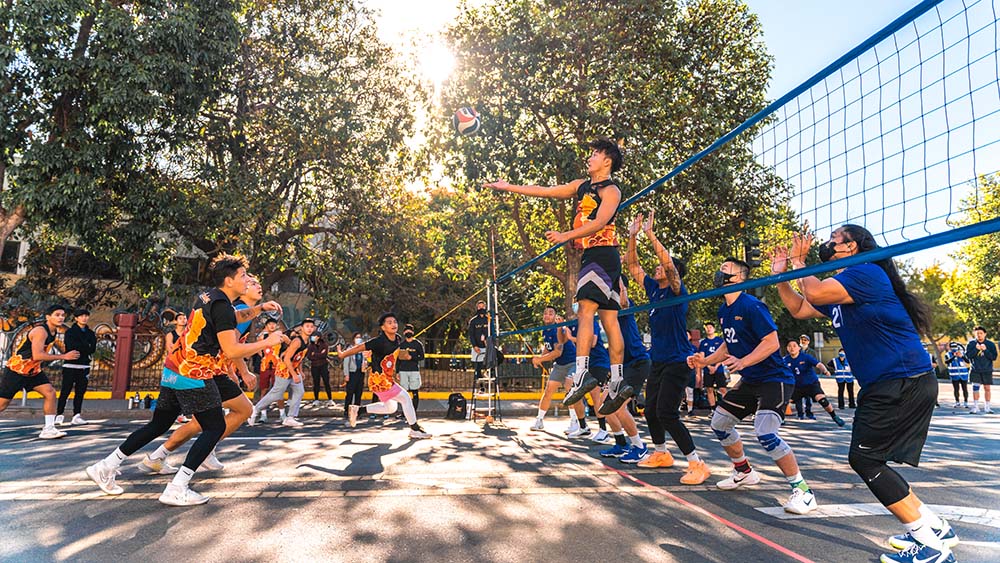
The North American Chinese Invitational Volleyball Tournament was played on the streets of Oakland’s Chinatown. (Photos courtesy Jordan Park/Visit Oakland)
Lincoln Square Park, in the heart of Oakland, California’s Chinatown, is perennially vibrant, thanks to the murals celebrating Asian culture painted on the park’s red and yellow buildings, its gardens, and a playground structure built to resemble a Chinese junk sailing ship. But on the morning of Oct. 15, as hundreds of people gathered for the launch of the 2021 North American Chinese Invitational Volleyball Tournament (NACIVT), the mood was positively electric.
“So here we are,” said Joseanna Tse, a player with San Francisco Dragons volleyball team, as she welcomed spectators — including me — and hundreds of athletes to the three-day tournament amid the rumble of Chinese barrel drums. “Today is a huge accomplishment.”
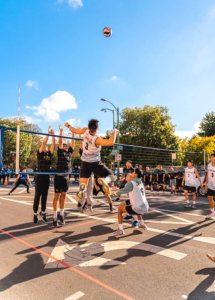
Two teams battle during the tournament, which had 60 teams registered to play in the 2021 tournament.
Months earlier, when the volunteers who make up the event’s planning committee began to talk about the 2021 tournament, they weren’t sure that holding the event was even possible, she said. Although vaccines against COVID-19 had been approved for emergency use, they had yet to be widely distributed. The tournament in recent years has rotated among seven major North American cities — Washington, D.C., Boston, New York, Los Angeles, San Francisco, Montreal, and Toronto — but what kinds of restrictions would be placed on gatherings in those cities later in the year, or the status of travel between Canada and the United States, were still a big unknown. At that time, Tse said, “volleyball was definitely out of the question.”
But NACIVT was determined to press ahead with planning a tournament if it could be held safely, said Bicky Ta, a committee member who lives in Los Angeles. COVID-19 had already canceled the 2020 competition and, for participants in the nearly 80-year-old tournament, the experience is about more than sport — it’s a celebration of Chinese identity and community. The tournament event officially began in the 1940s, but the history of volleyball in Chinatowns in the U.S. goes back even further, to the years following the 1882 Chinese Exclusion Act, which banned Chinese immigrations and excluded Chinese residents in the U.S. from citizenship. Similar laws restricted Chinese immigration in Canada.
Until 1943, when the Chinese Exclusion Act was repealed, the majority of Chinese Americans lived in segregated Chinatowns. “A lot of these workers couldn’t leave the country and they couldn’t communicate with family back home. So, they formed their own communities,” Ta said.
“And eventually these [volleyball] tournaments started popping up because young kids wanted to play, and they would roll up a ball of yarn or a ball of laundry and just toss the ball around.” Over time, the volleyball games played in Chinatowns evolved with their own sets of rules and became known as “9-Man.” Teams began traveling to other cities to play against other Chinatown teams, and the tournament eventually became a Labor Day tradition, Ta said. Women began playing in the tournaments in 1973 — Ta has played in the tournament for 16 years.
The annual event has become intergenerational, and many players who met on the volleyball court have gotten married. “Their kids now play, and some of them even have grandkids that play,” she said. “The huge thing behind the tournament was supporting our local communities. There’s a lot of history behind it.” The tournament, while friendly, is also hotly contested athletically. “This is our World Series,” a player told the makers of 9-Man, a 2014 documentary about the volleyball tournament. “This is our Super Bowl.”
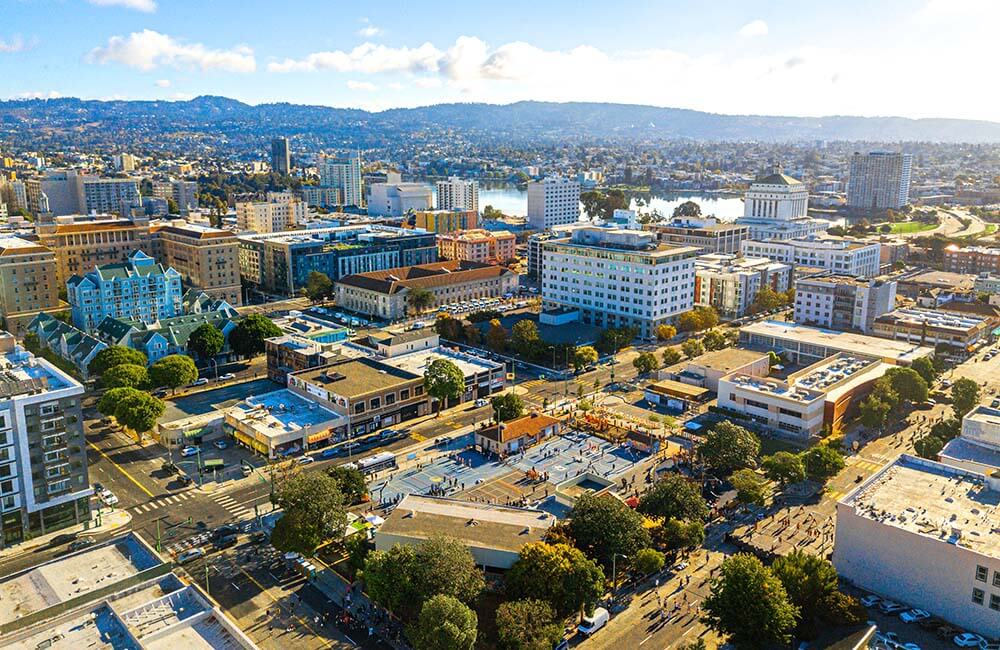
Volleyball courts ring the perimeter of Lincoln Square Park in Oakland’s Chinatown during the tournament.
A Perfect Fit?
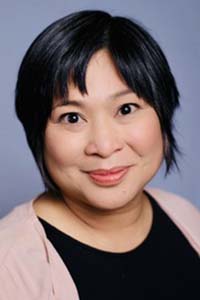
Rhanee Palma
When Rhanee Palma, CDME, was chief sales officer at Visit Oakland, one of her longstanding goals was to get the city in front of the NACIVT planning committee. To Palma, now CEO of Sacramento-based site-selection and hospitality consulting firm Palma & Co, Oakland and NACIVT seemed like a perfect fit. Oakland’s Chinatown is one of the oldest and largest in the U.S., bursting with restaurants, tea shops, and markets, and is adjacent to parks, a waterfront entertainment district, and Oakland’s diverse culinary scene. And crucially, Palma said, NACIVT’s mission to support Asian American communities aligned with one of Oakland’s key strengths: its diversity. Oakland’s commitment to social justice is in tune with NACIVT’s mission, said Palma, a first-generation Filipina American immigrant who came to the U.S. under political asylum. “The volleyball tournament was an act of political resistance against the Chinese Exclusion Act. They were trying to find the positive in very oppressive situations.”
Two years ago, Palma convinced NACIVT committee members to come to Oakland for a site visit, even though she knew its size, compared with the larger cities on the rotation, would make it a hard sell. Their verdict: Oakland was just too small for a full-sized tournament, which draws more than 150 teams each year, plus coaches and spectators. “And that was the end of that,” Palma said. “I kept in touch with them, thinking there might be a smaller regional event someday.”
Anti-Hate, Pro-Oakland
Last winter, as the planning committee was meeting on Zoom, Ta said, “talking about what might happen with the tournament and if it was even doable,” current events came up, including the dramatic rise in anti-Asian hate crimes since the onset of the pandemic. “And then someone suggested,” Ta said, “that we should take the tournament to the local Chinatown in Oakland.”
Oakland was in the news after Carl Chan, executive director of the Oakland Chinatown Chamber of Commerce, was assaulted in a racially motivated attack on the streets of Oakland’s Chinatown. Chan, who was on the way to the hospital to visit another victim of anti-Asian violence when he was attacked, began holding press conferences and speaking out about the dramatic rise in anti-Asian hate crimes.
Oakland now made sense as the host destination. The city’s smaller capacity was no longer an issue because the event was projected to be smaller than usual, given travel restrictions and participants’ comfort level about traveling, Ta said.
“And we wanted to be able to support the local businesses, as crimes were rising in Oakland,” Ta said. “A lot of people didn’t feel safe and we wanted to take a stand, and say, ‘We are here. We are an Asian event and we’re all safe.’”
In the past, as the NACIVT tournament rotated between cities, local teams hosted the event. But for the 2021 tournament in Oakland, the national committee, meeting on Zoom, acted as the host. And for the first time in its history, NACIVT hired a meeting planner — Palma, who left her sales job at Visit Oakland in April.
It was a bittersweet experience for Palma to finally bring the tournament to the city that she had spent years championing, she said, but no longer as part of the Visit Oakland team. But Palma’s years of experience in Oakland allowed her to leverage all the destination’s strengths as she shepherded the tournament through a complicated planning process.
One of the most significant advantages of a destination of Oakland’s size is its flexibility — a quality that was sorely needed in the months preceding the tournament, Palma said, when “a lot of things were up in the air.” In order to emphasize that Oakland’s Chinatown is safe, it was important to the NACIVT committee that the event take place outside — which would require that Oakland shut down city streets around the perimeter of Lincoln Square Park to provide enough space to create temporary volleyball courts for the 60 teams that were scheduled to play. But COVID-19 complicated the permitting process, partly because the pandemic kept city offices closed, and because the rules about the number of people who could gather kept changing, Palma said. “It was really interesting just negotiating all the different scenarios that could happen.”
Negotiating with hotels — the Oakland Marriott City Center was the tournament’s headquarters hotel — also took patience on the part of all parties, Palma said. Leisure travel had come roaring back in mid-2021, and hotels were more reluctant to negotiate on price. And NACIVT, as a nonprofit, volunteer-led group, was price-sensitive. “We had to find a way to work together,” Palma said.
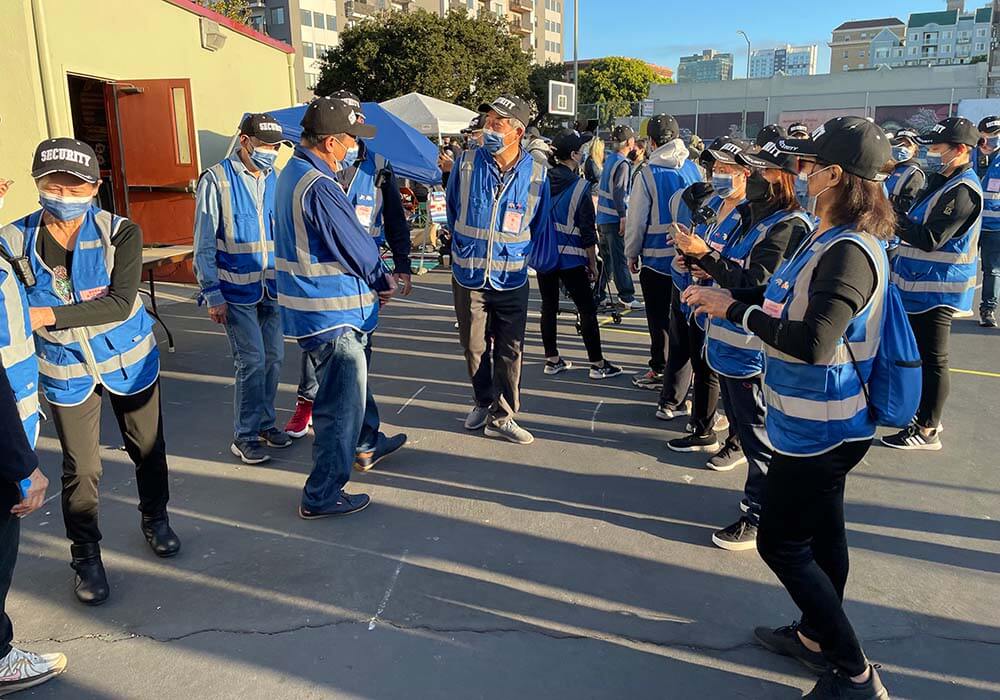
The Chinatown Blue Angels Volunteer Patrol team were a benevolent presence at the three-day North American Chinese Invitational Volleyball Tournament in Oakland.
It was challenging, but Palma said she was able to get things done, in part because of the willingness the hospitality industry, local organizations, and city departments to cooperate with one another. Unlike larger destinations, where all but the largest events might get lost, “we really activated the whole city” for NACIVT, Palma said. “There’s no way we could have done this without the support of the local Chinatown or the police department.”
In making the point that Oakland’s Chinatown was safe, NACIVT also wanted to make sure that the tournament participants were comfortable, Ta said. Before the tournament, “there were a lot of players who had a lot of hesitation” because of the news about violence against Asian-Americans in Oakland, she said. “We made sure that we had extra security there just so that people would feel safe.”
In addition to Oakland police, security over the three days of the tournament included members of Chinatown Blue Angels Volunteer Patrol Team, a group of volunteers of all ages, who mobilized early in 2021 to accompany pedestrians who might otherwise feel vulnerable to attack in Chinatown. The Blue Angels were introduced to applause at the opening ceremony and maintained a presence at the tournament that felt like a small army of crossing guards. The Blue Angels were “an extra set of eyes, just in case something were to happen,” Ta said. “I think the best thing about Oakland was that we had a lot of support from the local community.”
Afterwards, Ta asked some of the participants how they felt about the tournament. “They said it was great. Walking on the streets after the tournament, from the playground back to the hotel, they felt safe. There was no point at which they ever felt threatened by anybody. That was definitely nice to hear — that we were able to get their mindset to kind of change how they feel about Oakland.”
The growth of the tournament has been both a good and a bad thing, Ta said. As the tournament has gotten bigger, “our Chinatowns are dying — and they’re getting smaller and smaller.” In recent years, the tournament has taken place inside convention centers, and at a distance from the bustle of local Chinatowns. “It was nice to see the tournament played on the streets, where it traditionally was held in the past,” she said. For many of the younger players, she added, it was their first experience of playing the tournament on asphalt, in a Chinatown, where it began.
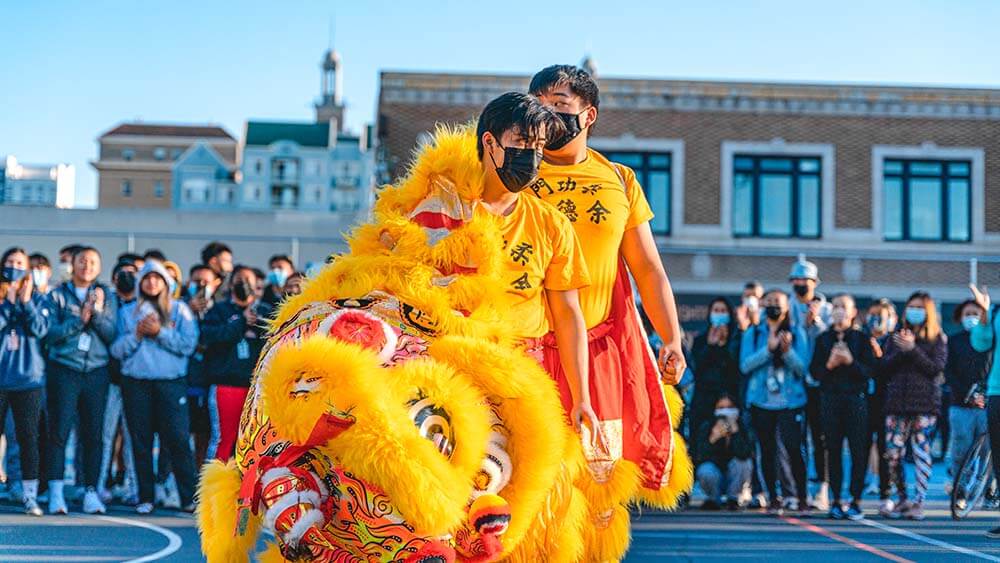
A Lion Dance, performed to bring good fortune to the audience, opened the North American Chinese Invitational Volleyball Tournament.
Looking Ahead
Because the tournament was smaller this year, NACIVT also relaxed a rule that had created controversy over the years: The tournament has long required that six of the nine players on each team be fully Chinese in order to participate and that the three remaining players be of Asian descent. Participation in the 2021 tournament was open to all Asians, Ta said. The change could become permanent, going forward, she said. “I’m all for opening up the tournament to all of the Asian races and making the rules a lot more relaxed. There are so many people out there who want to be able to experience this tournament and are not able to and it’s unfortunate.
“I’ve been playing volleyball for over 25 years, and I’ve played in a lot of different organizations from all over. There’s no other one that feels like this tournament,” Ta said. “There’s just something special and different about this one, in the camaraderie, the way people support each other from different teams. This is a really great event and from the bottom of my heart, I feel like this is something special and I want to be able to share it with the world.”
Despite all the obstacles along the way, Palma never doubted that the 2021 tournament would take place, she said, especially “once the vaccines started rolling.” (Participants were required to show proof of vaccination or a negative COVID-19 test.) NACIVT “was very motivated to help [Oakland’s] Chinatown economically, as well as perception-wise and safety-wise. It was their main goal. They were making a stand.” The committee is still meeting to decide where the 2022 tournament will be held, but there was talk at the tournament in October that Oakland would be added to the list of cities on the tournament rotation.
“That seems to be the magic formula — when you can make sure that your city complements the mission” of an organization’s conference or event, Palma said. “I don’t even think any of us really anticipated the magnitude of what would happen from this. This is what events do. This is the power of events.”
A Participant’s Video of the Tournaments First Day
Getting to Why
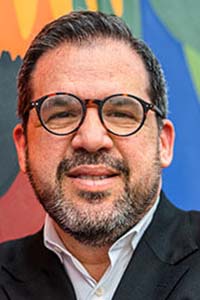
Peter Gamez
Over the last two years, the pandemic has reshuffled much of what was once taken for granted in the events world, and for Peter Gamez, who became the CEO of Visit Oakland in August, that includes looking at the impact of events with a different calculus.
“We’ve all had to step back,” Gamez said. Before the pandemic, “to put it bluntly, we were more transactional: ‘Hi, a volleyball tournament? We have this space or not.’ We have had to move away from that and see how we can make a bigger impact.”
As a new CEO, seeing the impact of bringing NACIVT to Oakland was inspiring him to think more deeply about the connections between events and the community, he said. “I’m asking myself, what other aspects can I bring into events to really draw in the community?”
It requires, he said, “asking a little bit more than the typical ‘Oh, you have a thousand people. I can take your group or not.’” Rather than being transactional, “stop and ask some more questions,” Gamez said. “Look at why we do this.”
Barbara Palmer is deputy editor of Convene.
